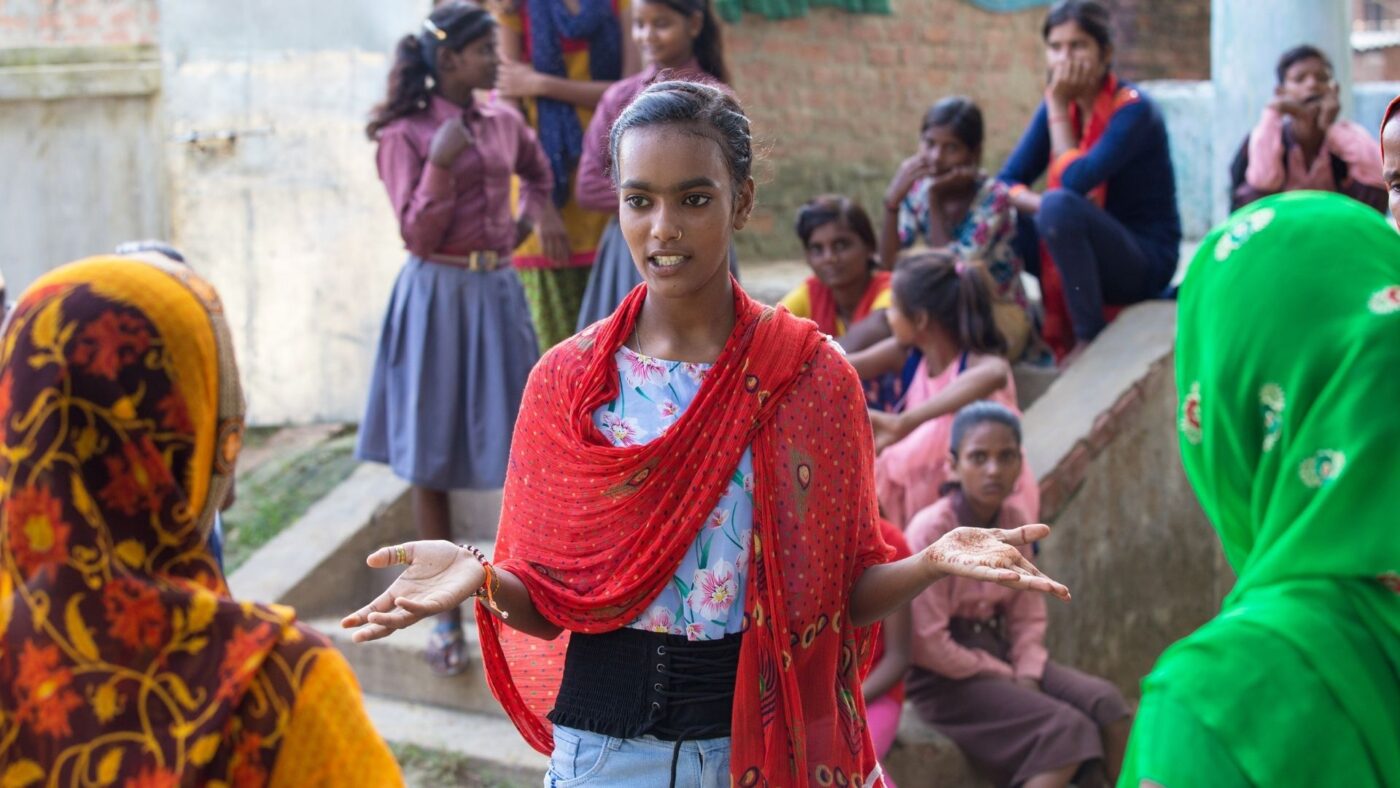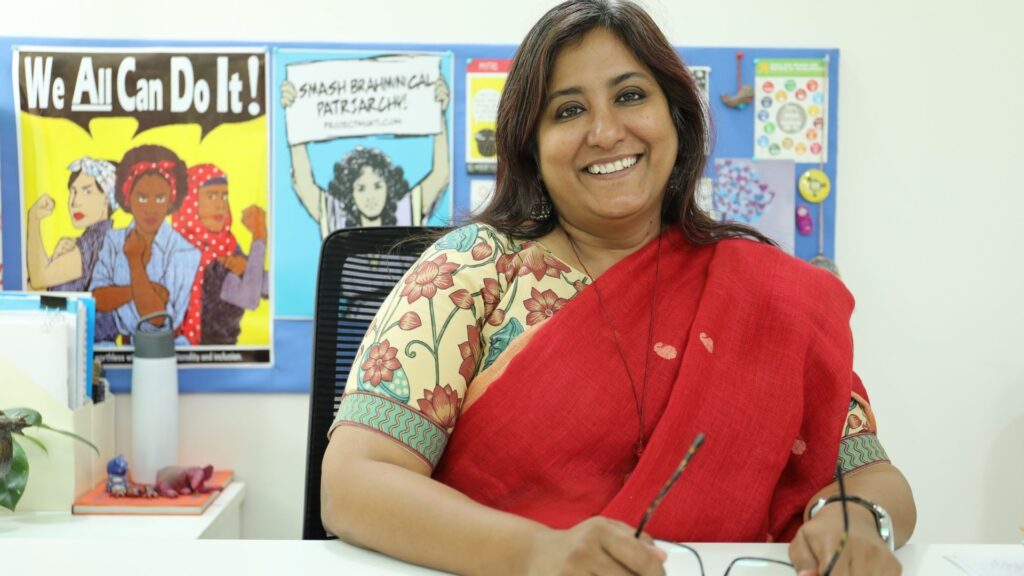Through skillful use of media, arts and technology, Breakthrough is working to change a culture and demonstrate the value of women and girls.
December 2021

Inspired by a play staged at her school by Breakthrough as part of its “Nation Against Early Marriage” campaign, Tabu, at the age of 15, intervened to stop the early marriage of her sister. She continues to work with other girls in her village. Photograph courtesy Breakthrough
The girls in the village of Murailapur in Uttar Pradesh’s Jaunpur district were not trying to change cultural attitudes in India—they just wanted to play cricket.
It was not easy. Cricket is regarded as a “man’s game” in much of India, including Murailapur. Fathers, brothers and even some mothers made their opposition quite clear to what they saw as a threat to the ways things were. Some of the girls were threatened. But they prevailed, with the help of Breakthrough, a nonprofit organization that makes discrimination and violence against girls and women unacceptable in society.
“The young girls residing in the area were no different from the others across the country, except for one facet—they had an innate interest to play cricket,” says Sohini Bhattacharya, chief executive officer of Breakthrough India. “Unfortunately, they had to put up with a whole lot of gender discrimination, sexist attitudes and societal constraints to engage in the ‘gentlemen’s game.’ However, the girls overcame it all. They have set in motion a transformative change by challenging the status quo.”
The girls in Murailapur benefitted from a Breakthrough representative who went door-to-door (some were slammed in her face) to try to persuade parents to let the girls play cricket. It was part of Breakthrough’s Adolescent Empowerment Program in Uttar Pradesh, Bihar, Jharkhand and Haryana, where crimes against women and early marriage are long-standing obstructions to equality.
While Breakthrough works directly to help women, the organization’s ultimate goal is nothing less than changing a culture that devalues women. That requires reaching millions of people at all levels of society, which Breakthrough accomplishes with skillful use of media, arts and technology.

Breakthrough CEO Sohini Bhattacharya. Photograph courtesy Breakthrough
“Since the beginning, all our campaigns and activities are designed and developed to make people aware of human rights violations in a language that they can relate to,” Bhattacharya explains. “We strongly believe that pop culture is the best medium to drive home the message and make people aware of gender-based violence and human rights violations in a non-threatening way.”
An early and powerful example of Breakthrough’s strategy was the 2001 creation of a hugely popular album and music video, “Mann ke Manjeeré—An Album of Women’s Dreams.” The album and video became the basis of a national campaign relating the true story of a woman who broke out of her abusive marriage and became a truck driver to support herself and her child.
“The success of our first-ever campaign—Mann ke Manjeeré—further reinforced our belief in the power and potential of pop culture for positive and lasting change in our society,” Bhattacharya says.
Another campaign, Bell Bajao! (Ring the Bell) prompted bystanders to intervene in cases of domestic violence not by directly confronting the perpetrator, which could lead to more violence, but by taking simple actions like ringing a bell to create an interruption or make the neighborhood aware of what was happening.
“Bell Bajao! is Breakthrough’s most evolved and sustained campaign to date—it has had the greatest impact, scale and the most comprehensive set of partners,” says Bhattacharya. “It is a cultural and media campaign that calls on men and boys to join efforts to end violence against women.
The campaign’s media component was its most prominent and visible feature—a series of television, radio and print ads created pro bono by Ogilvy and Mather, which were disseminated widely through a partnership with the Indian Ministry of Women and Child Development. The campaign was also implemented in China, Vietnam, Pakistan and Canada, among other countries, and was adopted by the United Nations as a flagship campaign. The effort resulted in a 49 percent increase in the number of people aware of the Protection of Women from Domestic Violence Act in India, and a 15 percent increase in access to services for survivors.”
Founded in 1999 and funded primarily by foundations, Breakthrough has become an international organization with 128 employees, and centers in New York City and New Delhi. It works with communities across Delhi, Punjab, Haryana, Uttar Pradesh and Jharkhand. Breakthrough also enlists other organizations that share its vision of changing societal norms and can help spread its message.
“We partner with media houses, over-the-top video platforms and the fashion industry on one hand and with government, both local and state-level, and with multi and bilateral organizations and civil society organizations on the other hand,” Bhattacharya says. “We believe that achieving scale on an issue like this is important because unless large numbers of people are going to outlaw violence, then norms will not begin to change.”
Although Breakthrough uses multiple programs to reach people of all ages, it places particular value on communicating with the young. In December 2020, Breakthrough launched Dakhal Do (intervene), a multi-year campaign on bystander intervention to encourage young people, especially between the ages of 19 to 25, to call out violence against women when they witness it, either in their own lives or at public places. The campaign aims to position intervening as the cool and better thing to do through positive action stories.
“Breakthrough believes youth can transform society by challenging the gender norms that contribute to girls and women having less worth, opportunity and agency than boys and men,” Bhattacharya says. “So far, we at Breakthrough have trained as many as 100,000 people on gender, sexuality and human rights issues and over a million men have signed the pledge against domestic violence. All over the country, young people are joining the cause, starting a dialogue and keeping this movement alive.”
Steve Fox is a freelance writer, former newspaper publisher and reporter based in Ventura, California.
COMMENTS